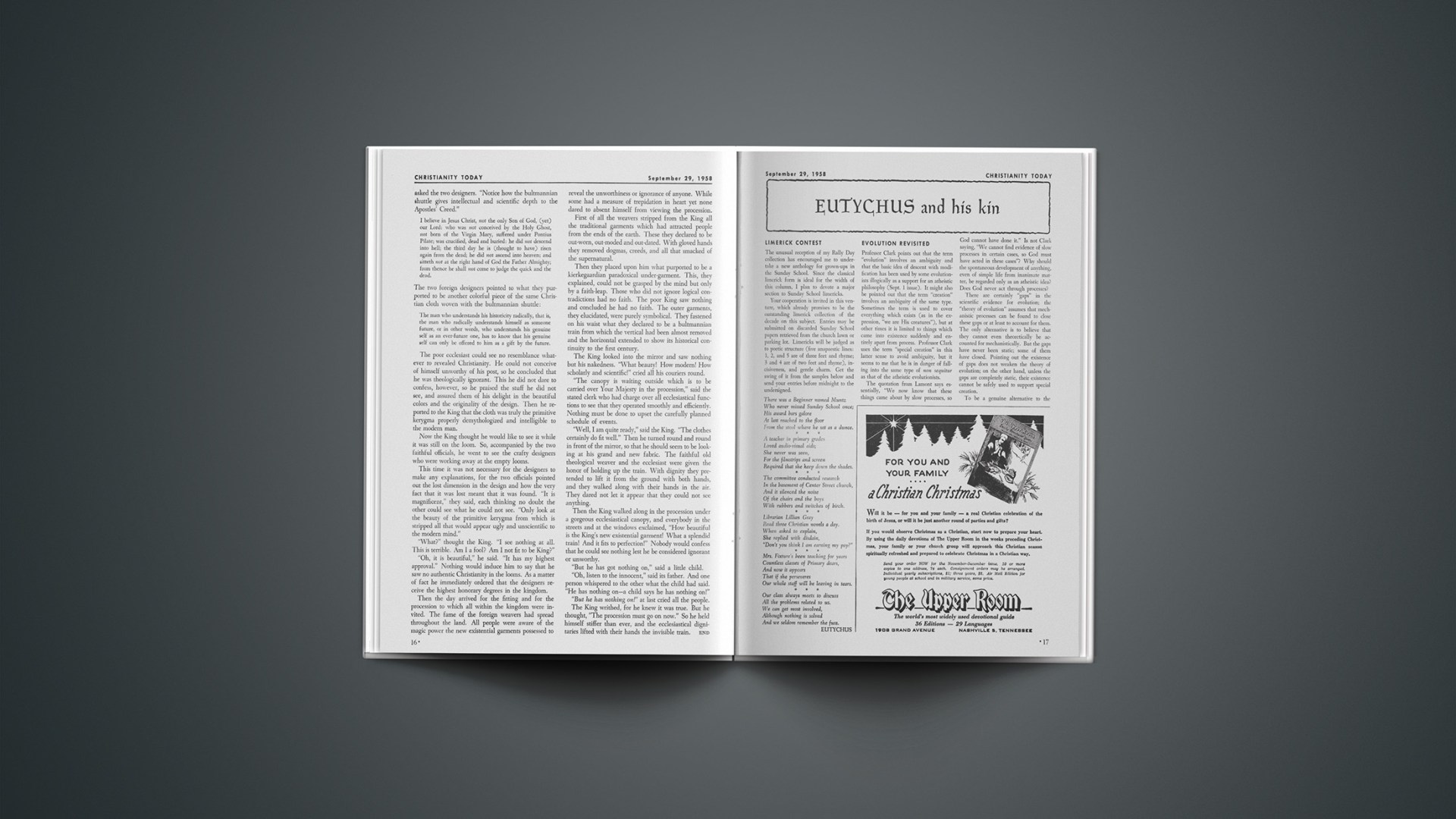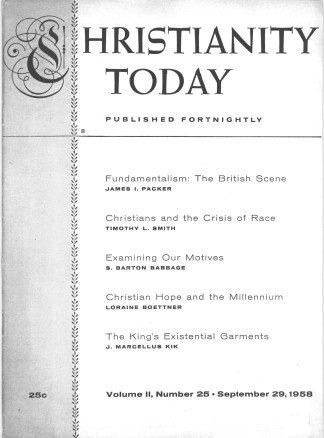LIMERICK CONTEST
The unusual reception of my Rally Day collection has encouraged me to undertake a new anthology for grown-ups in the Sunday School. Since the classical limerick form is ideal for the width of this column, I plan to devote a major section to Sunday School limericks.
Your cooperation is invited in this venture, which already promises to be the outstanding limerick collection of the decade on this subject. Entries may be submitted on discarded Sunday School papers retrieved from the church lawn or parking lot. Limericks will be judged as to poetic structure (five anapaestic lines: 1, 2, and 5 are of three feet and rhyme; 3 and 4 are of two feet and rhyme), incisiveness, and gentle charm. Get the swing of it from the samples below and send your entries before midnight to the undersigned.
There was a Beginner named Muntz
Who never missed Sunday School once;
His award bars galore
At last reached to the floor
From the stool where he sat as a dunce.
A teacher in primary grades
Loved audio-visual aids;
She never was seen,
For the filmstrips and screen
Required that she keep down the shades.
The committee conducted research
In the basement of Center Street church,
And it silenced the noise
Of the chairs and the boys
With rubbers and switches of birch.
Librarian Lillian Gray
Read three Christian novels a day.
When asked to explain,
She replied with disdain,
“Don’t you think I am earning my pay?”
Mrs. Fixture’s been teaching for years
Countless classes of Primary dears,
And now it appears
That if she perseveres
Our whole staff will be leaving in tears.
Our class always meets to discuss
All the problems related to us.
We can get most involved,
Although nothing is solved
And we seldom remember the fuss.
EVOLUTION REVISITED
Professor Clark points out that the term “evolution” involves an ambiguity and that the basic idea of descent with modification has been used by some evolutionists illogically as a support for an atheistic philosophy (Sept. 1 issue). It might also be pointed out that the term “creation” involves an ambiguity of the same type. Sometimes the term is used to cover everything which exists (as in the expression, “we are His creatures”), but at other times it is limited to things which came into existence suddenly and entirely apart from process. Professor Clark uses the term “special creation” in this latter sense to avoid ambiguity, but it seems to me that he is in danger of falling into the same type of non sequitur as that of the atheistic evolutionists.
The quotation from Lamont says essentially, “We now know that these things came about by slow processes, so God cannot have done it.” Is not Clark saying, “We cannot find evidence of slow processes in certain cases, so God must have acted in these cases”? Why should the spontaneous development of anything, even of simple life from inanimate matter, be regarded only as an atheistic idea? Does God never act through processes?
There are certainly “gaps” in the scientific evidence for evolution; the “theory of evolution” assumes that mechanistic processes can be found to close these gaps or at least to account for them. The only alternative is to believe that they cannot even theoretically be accounted for mechanistically. But the gaps have never been static; some of them have closed. Pointing out the existence of gaps does not weaken the theory of evolution; on the other hand, unless the gaps are completely static, their existence cannot be safely used to support special creation.
To be a genuine alternative to the theory of evolution, the theory of special creation must say exactly at which points God has acted suddenly and without process. The creation of life is usually taken as one of these points, but investigators in my own field, biochemistry, are actively narrowing this “gap” from both sides. The gap between inanimate matter and living things is not where it used to be. Inanimate matter has been shown to be capable of spontaneously forming more complex arrangements than previously thought possible; sub-living systems less complex than the cell have been shown to carry on many of the processes formerly associated only with living things. As Christians, can we not still see the creative hand of God in these places where gaps used to be?
Professor Clark points out that special creation is incompatible with what might be called “general evolution.” After reading his article and trying to think through my own position I have decided that I must be a “general creationist” and a “special evolutionist.”
Asst. Prof. of Chemistry
Iowa State College
Ames, Iowa
“The fresh look at the hypothesis of evolution” has a helpful insight into the problem faced by the orthodox who still resist the acceptance of the total evolutionary philosophy. Dr. Clark is to be commended for recognizing that species need not be considered incapable of mutating to other species. He quotes Goldschmidt who held that species are separated by bridgeless gaps. This concept is not held by the majority. Dobzhansky, for example, has a section in his 1951 volume which shows how some species of fruit fly are clearly separable from others, but others are on the borderline of the separation of one species into two. Let no creationist be found maintaining that species are fixed.
Scripture teaches that man arose from non-living matter—dust—by the act of God. Did not the first living thing so arise? Read George Wald’s … article on the “Origin of Life” in Scientific American a couple of summers ago to see modern ideas of life’s origin.
To be sure, we do not have a continuous fossil series (there are a number from a species through a second to a third, or even farther). Anyone will be cautious in using this argument from silence if he reads G. G. Simpson’s The Major Features of Evolution, 1953. Our belief in creation rests on revelation, not on an incomplete fossil record.
Prof. of Zoology
Wheaton College
Wheaton, Ill.










